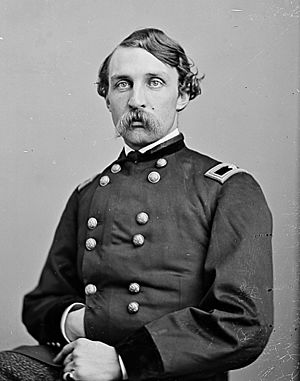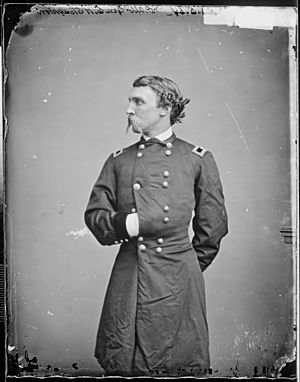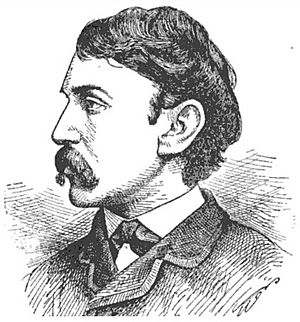Edwin H. Stoughton facts for kids
Quick facts for kids
Edwin Henry Stoughton
|
|
|---|---|
 |
|
| Born | June 23, 1838 Chester, Vermont |
| Died | December 25, 1868 (aged 30) Dorchester, Massachusetts |
| Buried |
Immanuel Cemetery, Bellows Falls, Vermont
|
| Allegiance | United States of America Union |
| Service/ |
United States Army Union Army |
| Years of service | 1859–1863 |
| Rank | |
| Commands held | 4th Vermont Infantry 2nd Vermont Brigade |
| Battles/wars | American Civil War
|
| Other work | Attorney |
Edwin Henry Stoughton (born June 23, 1838 – died December 25, 1868) was a soldier who served in the Union Army during the American Civil War. He was made a brigadier general, which is a high-ranking officer. However, his appointment was not officially approved by the U.S. Senate, so it ended. A few days later, in March 1863, he was captured by a famous Confederate soldier named John S. Mosby. This happened while Stoughton was sleeping at his headquarters in Fairfax Court House, Virginia. This event became very well known, and Stoughton was often made fun of because of it. He was later traded for another prisoner but left the army after he wasn't made a general again.
Contents
Early Life and Education
Edwin Stoughton was born in Chester, Vermont. His parents were Henry Evander and Laura Stoughton.
He began his military training at the United States Military Academy (West Point) on July 1, 1854. He graduated in 1859. After graduating, he served as a second lieutenant in the U.S. Army.
Military Career During the Civil War
In March 1861, Stoughton left his regular army position. In September, he became the commander of the 4th Vermont Infantry regiment. He was given the rank of colonel. At just 23 years old, he was said to be the youngest colonel in the entire army.
He led his troops during the Peninsula Campaign. His good performance led to him being chosen for a promotion. He was also given command of a larger group of soldiers called a brigade.
Becoming a General
In November 1862, Edwin Stoughton was made a brigadier general of Volunteers. On December 7, he took command of the 2nd Vermont Brigade. His brother, Charles B. Stoughton, took over command of the 4th Vermont Infantry.
However, Stoughton's promotion was never officially approved by the U.S. Senate. This meant his appointment as a general ended on March 4, 1863. This was less than a week before a famous event involving him.
Captured by Mosby's Rangers
On March 9, 1863, a group of Confederate soldiers called Mosby's Rangers raided Union territory. They were led by Confederate officer John S. Mosby. During this daring raid, they captured General Stoughton.
Stoughton had been at a party with his mother and sister. They were staying at a house in Fairfax Court House. After the party, Stoughton went to a nearby house that was his headquarters. Mosby supposedly found Stoughton asleep in his bed.
When Stoughton woke up, he reportedly shouted, "Do you know who I am?" Mosby quickly replied, "Do you know Mosby, general?" Stoughton then asked, "Yes! Have you got the rascal?" Mosby's famous reply was, "No but he has got you!"
Many soldiers did not like Stoughton very much. So, few people were sad about his capture. President Abraham Lincoln heard about it. He famously said that he didn't mind losing a general, because he could "make another in five minutes." But he added, "those horses cost $125 apiece!"
Stoughton was held as a prisoner in Libby Prison in Richmond for two months. After that, he was part of a prisoner exchange. But he did not serve in the army again. Since the U.S. Senate had not approved his general's rank, he was not given the position again. He left the Union Army in May 1863 and moved to New York.
Later Life and Death
After the war, Stoughton became a lawyer in New York City. He worked with his father and his uncle.
In November 1864, some Confederate spies tried to set fire to parts of New York City. Most of them got away. But Stoughton's friend from West Point, Robert Cobb Kennedy, was captured. Stoughton defended him in court. Kennedy was found guilty and was executed in March 1865. He was the last Confederate soldier to be executed by Union authorities.
Edwin Stoughton died from tuberculosis on December 25, 1868. He was in Dorchester, Massachusetts. He was buried in the Immanuel Cemetery in Bellows Falls, Vermont. A local veterans' group was named after him.
Images for kids
 | Madam C. J. Walker |
 | Janet Emerson Bashen |
 | Annie Turnbo Malone |
 | Maggie L. Walker |




